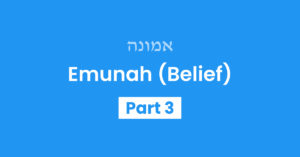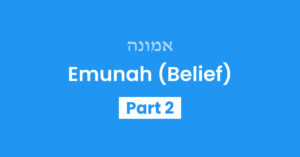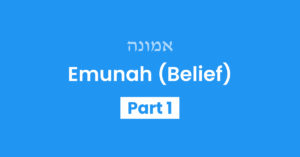We have spent this past month learning how to deepen our Emunah, which is the entire purpose of our existence. The first aspect of Emunah that we discussed is believing in Yecholes – that Hashem is capable of changing the rules of nature. Second, we discussed how we must believe in Hashgacha – that Hashem is aware of what goes on in this world, He is interested in what’s happening, and He is involved in deciding what will happen to us on a daily basis.
Finally, a third aspect of Emunah is believing in Yichud Hashem (the Oneness of Hashem). This means understanding that Hashem is the ONLY power that exists, and nothing can stop Him. No human being has the power to help or harm us if Hashem doesn’t allow it. We, too, are powerless without Hashem’s help. It is Hashem who enables us to talk, walk, move, and breathe every second of our lives. Understanding this truth is both humbling and reassuring: Humbling, because we realize our own limitations, yet reassuring because it means that Hashem can help us reach beyond those limitations.
All of these aspects of Emunah were proven to be true during Yetzias Mitzrayim, when Hashem did miracles to free the Jewish People from Egypt. This explains why we are required to celebrate Pesach every year, and remind ourselves of Yetzias Mitzrayim on a daily basis. After all – as Chazal teach1 – the entire purpose for why Hashem created this world was that so we should learn to have Emunah.
Speaking Words of Emunah
As you can see, there are many different aspects of Emunah that we need to remember: Hashem can do anything, Hashem is interested in my life, Hashem is the only Power… How can we possibly remember all of these things on a daily basis?
One way to ingrain these concepts of Emunah into our consciousness by speaking words of Emunah.
One way to ingrain these concepts of Emunah into our consciousness by speaking words of Emunah.
A hint to this concept is found in a passuk from Tehillim2 that we say in Hallel: “He’emanti Ki Adabeir – I believe as I speak.” Many commentaries3 interpret this passuk to mean that the more we speak words of Emunah, the more our Emunah will be strengthened in our hearts. “I believe as I speak.” It’s not enough to just think about Emunah; we are required to also express that Emunah in our speech.
What does it mean to speak words of Emunah? It means that our words should reflect the realization that Hashem is in control of our lives. When we say “I’m going shopping at 3:00,” we can sprinkle in a bit of Emunah by adding “B’Ezras Hashem – with Hashem’s help.” This means that I recognize that I do not have the power to get to the store on my own. I am dependent on Hashem to help me lift my feet, walk, breathe, and carry the items home.
Our words should reflect the realization that Hashem is in control of our lives.
Similarly, when we say, “I’m going to the store at 3:00, iy”H (Im Yirtzeh Hashem – If Hashem wants)” it means that I recognize that although I am planning to go to the store at 3:00, I do not know if Hashem will allow it to happen. If, for whatever reason, Hashem does not want me to go to the store at 3:00, He can cause circumstances to happen which prevent me from going. This realization can be reflected when I say “I am planning to go to the store at 3:00… iy”H (only if Hashem wants it to happen).”
Another common “Emunah” type of expression is the phrase “Baruch HaShem.” Sometimes we are so used to answering “Baruch Hashem” when someone asks “How are you?” that we forget what it means. It means that if I am feeling well right now, and I am safe and secure and comfortable, I recognize and appreciate that Hashem the the Source of all this goodness. (“Baruch” literally means “source.”)
It may seem as if these expressions are small or insignificant. But the truth is that every time we say “B’Ezras Hashem, “Im Yirtzeh Hashem,” or “Baruch Hashem,” we are strengthening our Emunah. We are pausing and reflect on the fact that Hashem is in control of my life. The more we speak words of Emunah – and share these words with other people – the more we will ingrain these truths in our hearts and minds.
Grazing Emunah All Day Long
Dovid HaMelech writes in Tehillim: “Sh’chan Eretz U’Re’eih Emunah – Dwell in the land, and graze Emunah.“4 What does it mean to “graze Emunah”?
Rav Dessler explains5 that just as sheep graze on grass all day long – and they are not satisfied with eating only during set times – so too, we must constantly involve ourselves in Emunah all day long. HaRav Yechezkel Levenstein zt”l was often quoted as saying that if he would let even one day pass by without making an effort to strengthen his Emunah, then inevitably, his Emunah would be weakened. If this is how HaRav Yechezkel Levenstein felt, then kal vechomer (all the more so) we, who are on a much lower level, must strengthen our Emunah on a daily basis – even multiple times a day.
So too, we must constantly involve ourselves in Emunah all day long.
Hopefully, if we work on strengthening our Emunah, then Hashem will redeem us from exile and bring our Ultimate Redemption in this merit, as Chazal teach: Just as our ancestors were freed from Egypt in the merit of their Emunah, we, too, will merit to greet Mashiach and see our Ultimate Redemption in the merit of our Emunah.6
Sources: [1] See Ramban on Shemos 13:16; [2] Tehillim 116:10; [3] See Rav Pam on the Pesach Haggadah pg. 151; [4] Tehillim 37:3; [5] as quoted in Sifsei Chaim Middos Vol. 1 pg. 417; [6] Midrash Tanchuma: Beshalach 10, also Kad HaKemach: Emunah
Your Challenge
Once a day, say words that reflect your Emunah.
FOR EXAMPLE:
- When someone asks: “How are you?” you can answer: “Baruch Hashem” while thinking about how Hashem is helping you feel great right now.
- When someone asks what you’re doing tomorrow, say, “I’m planning to drive to Monsey, B’Ezras Hashem” while thinking about how you can only get there if Hashem helps you.
- When someone asks what time you are coming home, answer: “I’ll probably arrive around 7:00 im yirtzeh Hashem” while thinking about how the time of your arrival is dependent on Hashem. Hashem might make there be a lot of traffic if He wants you to get home late, or He might make there be zero traffic if He wants you to get home early.




